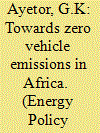| Srl | Item |
| 1 |
ID:
177500


|
|
|
|
|
| Summary/Abstract |
This paper reviews vehicle standards in Ghana and other parts of Africa. The paper also considers the cost of ownership of electric vehicles in Ghana. Tesla Model 3, Tesla Model S, Nissan Leaf and Toyota Prius are compared to Toyota Corolla. The parameters considered are initial cost, maintenance cost (spare parts and labour), fuel cost, and availability of skilled labour. Considering Ghana's energy mix, a conventional vehicle will emit 3.35 times more CO2 emissions compared with an electric vehicle. The results show that while there are 30% savings on cost per mile for Toyota Prius it cost at least 13.5% more to own an electric vehicle compared to Toyota Corolla. The Ghana government's tax incentive for removing import levy will only reduce the cost per mile by 2.5%. Ghana's energy surplus of 98.59 GWh is enough to charge at least 1.5 million electric vehicles. But a huge skills gap in electric vehicle maintenance, non-availability of spare parts, charging infrastructure and the initial price of electric cars are the main challenges to overcome to boost electric vehicle penetration in Ghana and other countries in Africa.
|
|
|
|
|
|
|
|
|
|
|
|
|
|
|
|
| 2 |
ID:
175233


|
|
|
|
|
| Summary/Abstract |
Corporate Average Fuel Economy (CAFE) Standards are among the longest-running energy regulations in the United States, enduring several decades of changing political winds. First implemented in 1978, they have been adapted over time, responding to lessons learned and changing circumstances. In combination with the more recent vehicle greenhouse gas emission (GHG) standards, they have achieved enormous fuel savings and emission reductions. Until the 2018 proposed rollback, the quality of research and analysis in support of rulemakings improved dramatically with advances in analytical methods, computing power and the resources dedicated to the task. Despite the abundance of fuel economy and related data, there has been no comprehensive assessment of the standards from 1975 to the present. This paper analyzes historical data to assess the real-world impact of the standards, as well as draw lessons about energy and environmental policy design. Cumulatively, fuel economy improvements due to the standards have reduced fuel consumption by well over one and a half trillion gallons, saved consumers trillions of dollars and avoided 14 billion tons of GHG emissions. Our analysis indicates that fuel savings have exceeded the cost of improving fuel economy, traffic safety has improved and the impact on vehicle travel has been small.
|
|
|
|
|
|
|
|
|
|
|
|
|
|
|
|